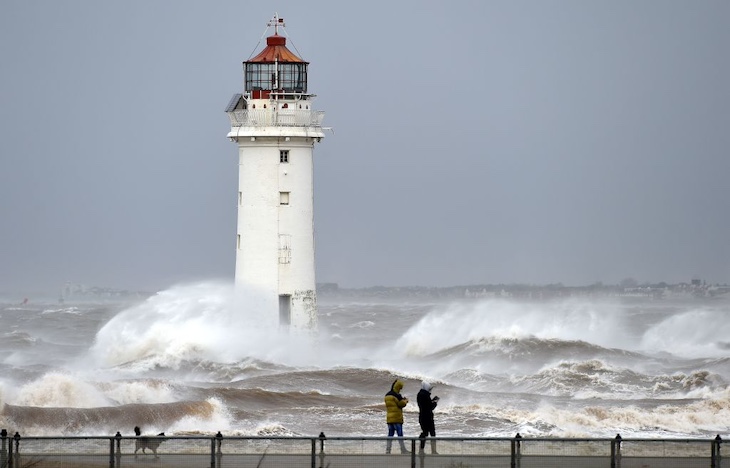The Shipping Forecast on Radio 4, 100 years old this October, seems to have achieved the impossible. Few people know the places it reports on when it gives the weather conditions in its 31 regions. Almost no one understands the finer points of what it’s telling them – about wind force and direction, atmospheric pressure, or visibility out at sea. Not many working people are even awake at the times it’s broadcast in the early hours. Yet you feel that if the BBC ever tried to cancel it, there would be a revolution.
Its very opacity is part of its charm, as well as the vivid but workaday metaphors it supplies us with
Few radio programmes have a more enduring place in the nation’s psyche; it’s inspired songs by Blur, Radiohead and Wire, poems by Seamus Heaney and Carol Ann Duffy, and has appeared (or been talked about) in films like Ken Loach’s Kes or Terence Davies’ Distant Voices, Still Lives. Olivia Colman, while filming The Crown, even said she periodically had it piped through on an earpiece, to maintain the correct stiff upper lip as the Queen. The Shipping Forecast, it seems, is an integral part of us, yet we don’t really know why.
Is it just the semi-mystical incantation of those names – Cromarty, Lundy, Shannon, Rockall, Malin Head – the words evocative but somehow unconnected with anything we know? Perhaps the forecast, as BBC announcer Chris Aldridge put it, is ‘something that defines us as an island nation… that binds us together when so much divides us.’ Fellow presenter Zeb Soanes described it as ‘part of the fabric of this intangible thing called Britishness. Just like red telephone boxes, Wimbledon, the chimes of Big Ben, the smell of cut grass, scones and jam’ – pretty tangible, then.
‘Sailing By’, Ronald Binge’s 1963 theme-tune to the programme, is one of the melodic mainstays of British life. With its waltz time and rising and falling woodwind arpeggio, it’s a comforting way to end – or begin – the day. On Desert Island Discs, Pulp lead singer Jarvis Cocker chose ‘Sailing By’ as one of his eight records, explaining that for him it was an ‘aid to restful sleep’, something apparently just as true for many of the forecast itself – ‘like a lullaby, almost,’ admits presenter Kathy Clugston.
On YouTube, ‘Five Hours of The Shipping Forecast on BBC Radio 4!’ has had 1.5 million hits, suggesting that while it may often deliver bad news to sailors (those ‘squalls’ and ‘gale warnings’) clearly for others it’s a bringer of peace.
Then there are those place names, with all their pictorial power. The North Sea zones ‘Dogger, Fisher, German Bight’ seem to conjure up something from Lewis Carroll’s Jabberwocky.
‘Dover, Wight, Portland, Plymouth’ sounds like the oldest, most prosperous stockbroking firm in the world. The phrase ‘North Utsira, South Utsira’ has a pleasing up and down lilt to it (even if rhythmically it’s a little reminiscent of ‘You buy some whisky drink / You buy some vodka drink’ from Chumbawamba’s ‘Tubthumping’).
We’re curious about these points on the map, and yet we don’t want to know too much: better to leave areas like ‘Viking’, ‘Rockall’ and ‘Biscay’ as places in the mind, summoning up images of the far-flung, primitive and ancient. It’s telling that in her recent BBC book The Shipping Forecast: Celebrating 100 Years, writer Meg Clothier warns the reader at one point she’s about to ‘take the magical, mystical words of the Shipping Forecast and suck all the magic, all the mystery right back out of them,’ suggesting they may wish to jump to another section.
Sadly, they may well find the magic sucked out there too. You can’t help but feel, reading Clothier’s book, that the programme, after 100 years of service, deserves rather better. No one can fault the author’s verve, scholarship or readability – we get interesting sections on the forecast’s founding father Vice-Admiral Robert Fitzroy, the bulletin’s undeniable poetry, and a poignant description of the conditions in which it may be listened to, at sea, early in the morning or late at night. But given that this is 2024 and the book has ‘BBC Radio 4’ stamped on its cover, we also get plenty about imperialism, climate change, racism, slavery, migrants, ‘male pride’ and so on, with occasional bits on the actual Shipping Forecast thrown in.
Nor, according to the book, should the late-night programme’s soothing effect allow anyone to nod off with too clear a conscience. ‘How, we must then ask ourselves,’ the author enquires at one point, in an eyewatering moral segue, ‘would Shipping Forecast sound to a young Iranian boy whose father drowned when his family crossed at Dover?’ It’s a question readers could perhaps ask of any bilingual children they meet from Tehran or Isfahan, should they catch them listening to Radio 4 FM at ten to one in the morning.
Yet most people, I suspect, find the Shipping Forecast appealing precisely because it’s one of the few programmes on Radio 4 these days that doesn’t batter them with such questions. Its very opacity, as Clothier acknowledges, is part of its charm, as well as the vivid but workaday metaphors it supplies us with.
‘Good becoming moderate or poor’ – that’s one we’re all familiar with, especially in our love affairs. ‘Variable, becoming cyclonic’ – I can think of at least two friends that applies to. ‘Visibility, moderate or good’ – most of us, surely, would settle for that as a destiny in life. And who isn’t unconsciously dreading their ‘General Synopsis’ at the end of it all?
All these things give the Shipping Forecast a resonance and power most BBC radio dramas can only dream of. The UK’s network of manned lighthouses – once so reassuring – may have gone, replaced by a soulless automation. But the Shipping Forecast remains, tying us all together.







Comments